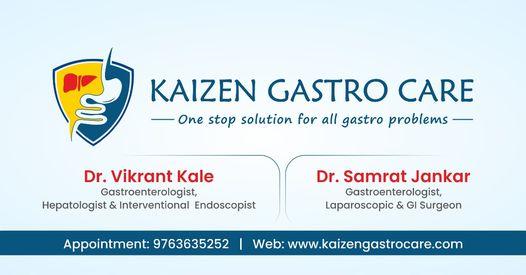How to deal with the Gas Problem
Regular digestion includes gas, and letting excess gas out through burping or flatus is also typical. However, you can experience discomfort if gas is retained, does not travel freely through your digestive tract, or creates intestinal distension, which some people find difficult to bear. Among other organs, the abdomen houses the pancreas, kidneys, diaphragm, spleen, gallbladder, liver, small and large intestines, gallbladder, and stomach. Abdominal discomfort, or “stomach ache,” is frequently brought on by gastric issues.
One of the top “Gastroenterology Clinics” in PCMC, Pune is Kaizen Gastro Care. Recognizing Digestive issues can be uncomfortable, unpleasant, and, in extreme instances, even life-threatening. Because of this, consulting a board-certified gastroenterologist with experience in digestive issues is always recommended. For more information on the causes of gas difficulties and how to treat them, see below.
What Is Gastritis or a Gastric Problem?
One of the most prevalent issues is gas problem, or a stomach ailment, which often develops after 40 years of age. Gastric issues, such as indigestion or an empty stomach, can be caused by different factors. An inflammatory condition, discomfort, or dissolution of the stomach is known as gastritis or a gastric issue. A painful and uncomfortable reaction results when these acids come into contact with the stomach walls. This syndrome ultimately results in a condition known as gastric reflux disease.
Gastric Problem Causes:
The gastric issue causes different things, such as consistently going for long periods on an empty stomach, consuming an extreme amount of unhealthy or spicy food, or even drinking alcohol. The main contributors to many stomach issues include stress, tension, and worry. The practice of improperly chewing food is another visible but significant factor. Additionally, internal infections might result in stomach issues. Other factors include:
H. pylori, often known as Helicobacter pylori, is a bacterium that dwells in the mucous membrane of the stomach. This infection, if left untreated, can cause ulcers and, in some cases, stomach cancer.
Bile reflux is the flow or leakage of liquid from the biliary system into the stomach.
Signs of a Gastric Issue:
Controlling Gastric Acid:
Here are a few straightforward recommendations for treating stomach issues at home:
Drink a lot of water, add lemon juice to your diet, sip warm water, and utilize baking soda and lemon.
Cold milk, buttermilk, and mint juice are also beneficial to consume. Attempt consuming tea as well. You can treat stomach bloating, the cause of gastritis, with a warm cup of fennel, chamomile, or ginger tea. You can consume wholesome meals. Eat more fruits, vegetables, and whole-grain meals. Attempt to consume less food as well.
Treatment and Diagnosis of the Gastric Issue:
To cure your problem, here are some tests-
Upper Endoscopy:
During an upper endoscopy, your doctor can inspect your esophagus, stomach, and a tiny portion of your small intestine. EGD, or upper endoscopy, is another name for this procedure. An endoscope is a small, flexible tube that is inserted into your mouth and slowly advanced via the neck into the intestines, stomach, and food pipe. Your doctor can observe your stomach and small intestine in detail because of the camera at the end of the tube.
Blood testing:
A complete blood count aids in excluding other disorders that may present with similar symptoms and indications. Your doctor can suggest a test to check for the Helicobacter pylori (H. pylori) bacteria, which typically causes stomach issues.
Fecal Occult Blood Test or Stool Test:
A stool culture looks for the presence of unusual bacteria in the digestive system that might lead to gastritis and other issues.
An appropriate course of therapy is recommended once the nature and severity of the gastrointestinal issue have been determined. To treat gastritis, medications to lower stomach acid, such as antacids.
Your gastroenterologist will recommend a course of multiple drugs to treat gastritis brought on by a viral or bacterial infection to lessen heartburn. By removing irritable items from your diet, you can reduce the impact of stomach issues. These foods often contain lactose from dairy or gluten from wheat.
Gastrointestinal Surgery at Kaizen Gastro Care Wakad in Pune is available if you have acid reflux. With all the due care and sophisticated conditions, the treatment of gastrointestinal surgery will be manageable and comfortable at kaizen gastro care.
